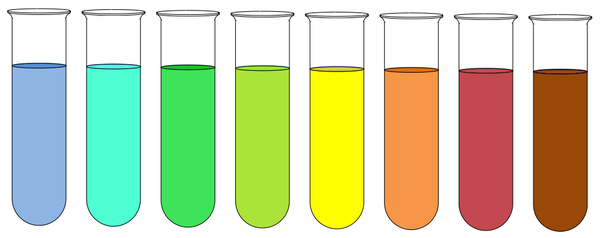Benedict's Test
Contents
Key Stage 3
Meaning
The Benedict's Test is a method for finding whether a food has sugar in it.
About the Benedict's Test
- Glucose and Fructose can be detected with the Benedict's Test.
- Sucrose cannot be detected with the Benedict's Test unless you first react it with dilute hydrochloric acid.
Method
- 1. A sample of food is dissolved in water.
- 2. The solution is added to blue Benedict's solution in a boiling tube.
- 3. The solution is kept at 90°C for up to 10 minutes.
- 4. A colour change indicates the presence of glucose or fructose. If they are present the solution will eventually turn brick red or brown.
| When sugar is present the Benedict's solution turns from blue through several colours until it becomes brick red or brown.
If this was done with sucrose the Benedict's solution would stay blue. |
Key Stage 4
Meaning
The Benedict's Test is a method for finding whether a food has sugar in it.
About the Benedict's Test
- Glucose and Fructose can be detected with the Benedict's Test.
- Sucrose cannot be detected with the Benedict's Test unless you first react it with dilute hydrochloric acid.
Method
- 1. A sample of food is dissolved in water.
- 2. The solution is added to blue Benedict's solution in a boiling tube.
- 3. The solution is kept at 90°C for up to 10 minutes.
- 4. A colour change indicates the presence of glucose or fructose. If they are present the solution will eventually turn brick red or brown.
| When sugar is present the Benedict's solution turns from blue through several colours until it becomes brick red or brown.
If this was done with sucrose the Benedict's solution would stay blue. |
References
AQA
- Benedict’s reagent, page 32, GCSE Biology; The Revision Guide, CGP, AQA
- Benedict’s test, page 118, GCSE Combined Science Trilogy; Biology, CGP, AQA
- Benedict’s test, page 124, GCSE Biology, CGP, AQA
- Benedict’s test, page 28, GCSE Combined Science; The Revision Guide, CGP, AQA
- Benedict’s test, pages 104-5, GCSE Biology; Student Book, Collins, AQA
Edexcel
- Benedict’s reagent, page 19, GCSE Biology; The Revision Guide, CGP, Edexcel
- Benedict’s reagent, page 43, GCSE Biology, CGP, Edexcel
- Benedict’s solution, page 14, GCSE Biology, Pearson, Edexcel
